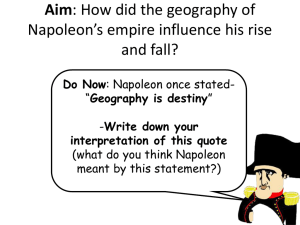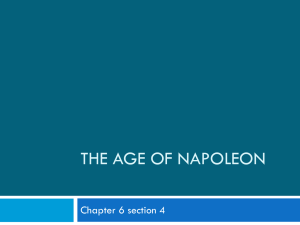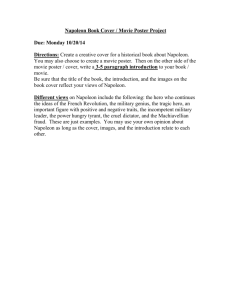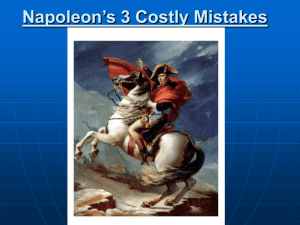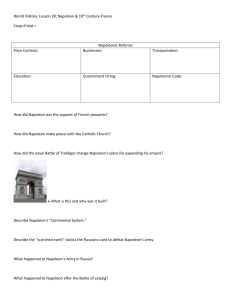Napoleon & Romanticism: AP Euro History Chapter 19 Overview
advertisement
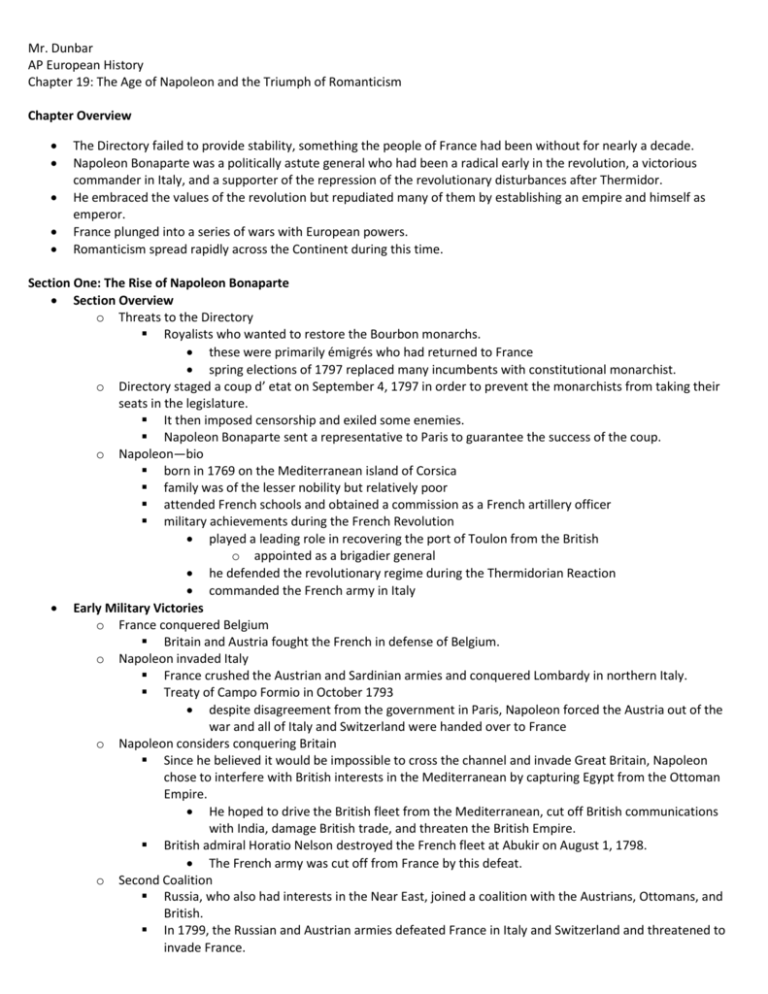
Mr. Dunbar AP European History Chapter 19: The Age of Napoleon and the Triumph of Romanticism Chapter Overview The Directory failed to provide stability, something the people of France had been without for nearly a decade. Napoleon Bonaparte was a politically astute general who had been a radical early in the revolution, a victorious commander in Italy, and a supporter of the repression of the revolutionary disturbances after Thermidor. He embraced the values of the revolution but repudiated many of them by establishing an empire and himself as emperor. France plunged into a series of wars with European powers. Romanticism spread rapidly across the Continent during this time. Section One: The Rise of Napoleon Bonaparte Section Overview o Threats to the Directory Royalists who wanted to restore the Bourbon monarchs. these were primarily émigrés who had returned to France spring elections of 1797 replaced many incumbents with constitutional monarchist. o Directory staged a coup d’ etat on September 4, 1797 in order to prevent the monarchists from taking their seats in the legislature. It then imposed censorship and exiled some enemies. Napoleon Bonaparte sent a representative to Paris to guarantee the success of the coup. o Napoleon—bio born in 1769 on the Mediterranean island of Corsica family was of the lesser nobility but relatively poor attended French schools and obtained a commission as a French artillery officer military achievements during the French Revolution played a leading role in recovering the port of Toulon from the British o appointed as a brigadier general he defended the revolutionary regime during the Thermidorian Reaction commanded the French army in Italy Early Military Victories o France conquered Belgium Britain and Austria fought the French in defense of Belgium. o Napoleon invaded Italy France crushed the Austrian and Sardinian armies and conquered Lombardy in northern Italy. Treaty of Campo Formio in October 1793 despite disagreement from the government in Paris, Napoleon forced the Austria out of the war and all of Italy and Switzerland were handed over to France o Napoleon considers conquering Britain Since he believed it would be impossible to cross the channel and invade Great Britain, Napoleon chose to interfere with British interests in the Mediterranean by capturing Egypt from the Ottoman Empire. He hoped to drive the British fleet from the Mediterranean, cut off British communications with India, damage British trade, and threaten the British Empire. British admiral Horatio Nelson destroyed the French fleet at Abukir on August 1, 1798. The French army was cut off from France by this defeat. o Second Coalition Russia, who also had interests in the Near East, joined a coalition with the Austrians, Ottomans, and British. In 1799, the Russian and Austrian armies defeated France in Italy and Switzerland and threatened to invade France. British, not Ottoman, forces drove the French out of Egypt in 1799. The Constitution of the Year III o Economic problems in France and a dangerous international situation led the Directory in France to propose a new constitution. o Abbe Sieyes was one of the Directors who had written the pamphlet What Is the Third Estate during the first months of the revolution. Sieyes now advocated for a strong executive, independent from electoral politics. o Napoleon left his troops in Egypt, returned to France, and aligned himself with Sieyes to back the new government. Sieyes had expected Napoleon to remove himself from politics after securing the coup o Details of the constitution It divided executive power among three consuls First Consul given supreme authority; Napoleon took this title Promoted universal male suffrage Included a complicated system of checks and balances o The textbook describes Napoleon as “the first modern political figure to use the rhetoric of revolution and nationalism, to back it with military force, and to combine these elements into a mighty weapon of imperial expansion in the service of his own power.” Section Two: The Consulate in France (1799-1804) Section Overview o The establishment of the Consulate effectively ended the revolution in France. o Accomplishments of the French Revolution Bourgeoisie abolished hereditary privilege which opened many careers based on talent which allowed them to achieve wealth, status, and security of their property Peasants gained land and destroyed the oppressive feudal system Suppressing Foreign Enemies o Napoleon seeks peace with foreign enemeies Russia had left the Second Coalition French forces handed Austria another defeat in Italy in 1800 Treaty of Luneville removed Austria from the war Britain and France made peace in 1802 with the Treaty of Amiens o Napoleon appeases his enemies in France issued a general amnesty and employed men from all political factions created a highly centralized administration used secret police to identify opposition he used an attempt on his life by royalists in 1804 to justify the suppression of the Jacobins in France in 1804, he violated the sovereignty of the German state of Baden to seize and execute the Bourbon duke of Enghien the duke was accused of participation in a royalist plot, though Bonaparte knew him to be innocent o the execution put an end to royalist plots Concordat with the Roman Catholic Church o Napoleon seeks reconciliation with the Church in order to satisfy his people. The policy of the revolutionary government toward the Catholic Church aroused much domestic opposition. When the French armies invaded Italy, they had driven Pope Pius VI from Rome, and he eventually died in exile in France. o Concordat It required both the refractory clergy and those who accepted the revolution to resign replacements received their spiritual investiture from the pope, but the state named the bishops and paid their salaries and the salary of one priest in each parish Church gave up its claim to confiscated property during the revolution Clergy had to swear an oath of loyalty to the state o Organic Articles of 1802 Without consulting the pope, the French government established supremacy of the state over the Church The Napoleonic Code o In 1802, a plebiscite ratified Napoleon as consul for life and he produced another constitution that granted him full power. o Civil Code of 1804 Conservative attitude toward labor and women was felt in the code Workers associations remained forbidden father’s were granted extensive control over their children and wives divorce remained more difficult for women than men It upheld the abolition of privileges based on birth before the code, French law had differed from region to region; the code unified law throughout France Establishing A Dynasty o Napoleon seized the bomb attack on his life to make himself emperor for life. believed it would make the new regime secure and make future efforts to take his life useless another constitution made Napoleon emperor for life this, too, was approved by plebiscite coronation ceremony held at the cathedral of Notre Dame in Paris Pope Pius VII attended but didn’t crown Napoleon; rather, Napoleon crowned himself to demonstrate his supreme authority Section Three: Napoleon’s Empire (1804-1814) Section Overview o Napoleon conquered most of Europe o France’s victories changed the map of the Continent o nationalism blossomed during Napoleon’s reign o size of the French army 700,000 men under arms at one time could risk 100,000 troops in battle, endure heavy losses, and could fight again Conquering an Empire o Section Overview Napoleon sent an army to restore the rebellious colony of Haiti this concerned the British who thought Napoleon had his heart set on an American empire The Treaty of Campo Formio involved France and the Dutch Republic, Italy, Switzerland, and Germany redistribution of territories along the Rhine River Austria loss influence in Germany all German states became dependent of Napoleon o British Naval Supremacy Britain—under prime minister William Pitt the Younger—established a Third Coalition, that included Russia and Austria, and declared war on France. Lord Nelson defeated a combine French and Spanish fleet at the Battle of Trafalgar off the coast of Spain. o Napoleonic Victories in Central Europe In October 1805, Napoleon forced an Austrian army to surrender at Ulm and occupied Vienna. On December 2, Napoleon defeated the combined Austrian and Russian forces at Austerlitz. Treaty of Pressburg o o Austrian surrendered its Italian possessions to France and Napoleon is recognized as king of Italy In 1806, Napoleon organized western Germany into the Confederation of the Rhine as a result, the Holy Roman Empire was dissolved Holy Roman Emperor Francis I took the title Emperor Francis I of Austria. Prussia declares war against France France quickly crushed the Prussians at Jena and Auerstadt. Two weeks later, Napoleon occupied Berlin and by June of 1807—having defeated the Russians—occupied East Prussia. Napoleon was the master of all Germany Treaty of Tilsit Negotiated by Napoleon and Tsar Alexander I on a raft in the Niemen River Prussia lost half its territory. Napoleon appointed members of his family to govern his empire his stepson ruled over Italy three of his brothers and a brother-in-law were made kings of other European states The Continental System o Berlin decrees disallowed European countries to import British goods. since he could not defeat the British navy, he decided to destroy their trade interests in Europe o The Milan Decree of 1807 Attempted to stop even neutral nations from trading with Britain o Resentment Some encouraged Napoleon to drop the high tariffs and open the French Empire to free trade Napoleon’s reluctance to do so injured many European economies o Napoleon invaded and conquered Spain in order to prevent smuggling. Section Four: European Response to the Empire Section Overview o Napoleon spread the Napoleonic Code to all regions of his empire and also abolished hereditary privilege. o In towns, guilds and oligarchies that had been dominant for centuries were stripped of power and influence. o The Continental System demonstrated Napoleon’s rule was intended to enrich France, rather than Europe generally. German Nationalism and Prussian Reform o Romantic movement in Germany produced nationalism in two distinct stages First, nationalistic writers emphasized the unique and admirable qualities of German culture, which they argued, arose from the history of the German people. Second, some German intellectuals began to urge resistance to Napoleon under the banner of German nationalism. They believed that only a people united through its shared language and culture could resist the French onslaught. After Tilsit, only Prussia was patriotic whereas the other German states were under Napoleon’s thumb or collaborating with him. o Prussia German nationalists fled to Prussia and attempted to unite Germany under King Frederick William III. Baron von Stein and Prince von Hardenberg were two reformers who hoped to produce a government that honored democratic rules but was guided by a monarch. serfdom was abolished power of Junker nobility was broken military reforms in Prussia Jena had shown the Prussians that a citizen-based military based on merit could defeat an army led by the aristocracy. Prussian military became open to commoners and nationalism was infused in the soldiers. Prussia was only permitted by Napoleon to raise an army of 42,000 men. Therefore, the Prussians evaded this policy by training one group each year, putting them in reserves, and then training a new group. o Prussian army secretly grew to 270,000 men by 1814 The Wars of Liberation o Spain Napoleon directed his army to enter Spain in 1807 in order to force Portugal to abandon its traditional alliance with Britain. The army remained in Spain and Napoleon used a revolt that broke out in Madrid in 1808 as a reason to depose the Spanish Bourbons. Napoleon placed his brother—Joseph—on the throne in Spain. Spanish peasants, under the guidance of the lower clergy, resisted French control of Spain. Guerilla bands in Spain killed French stragglers, cut lines of communication, destroyed isolated units, and retreated to the mountains. Britain’s response Army commanded by Sir Arthur Wellesley (the Duke of Wellington) landed in Spain to support the Spanish insurgents This marked the beginning of the long peninsular campaign that would drain French strength. o Austria Austria declared war on France in 1809 when they knew the French were deeply entrenched in Spain. The French army marched swiftly into Austria and won the battle of Wagram. Peace of Schonbrunn Austria lost much territory and 3.5 million subjects. Napoleon divorced his wife Josephine—now 46 and childless—and married the 18-year-old Austrian archduchess Marie Louise (1791-1847), daughter of Emperor Francis I. The Invasion of Russia o Russia’s problems with France Russian nobles disliked the alliance with France because they did not approve of French liberal policies. The Continental System prevented Russia from selling timber to the British. France’s occupation of Poland Tsar Alexander feared that Napoleon would launch an invasion of Russia from Poland. Napoleon’s annexation of Holland, his recognition of the French marshal Bernadotte as the future King Charles IV of Sweden, and his marriage to Marie Louise further angered the tsar. o In 1810, Russia withdrew from the Continental System and prepared for war. o The Invasion Napoleon amassed an army of 600,000 men plan for a quick victory ended as the Russians continued to retreat the Russian army implemented a “scorched-earth” policy they destroyed all food and supplies as they retreated terrible rains, fierce heat, shortages of food and water, and the courage of the Russian rear guard destroyed the morale of Napoleon’s army Battle of Borodino (not too far west of Moscow) France lost 30,000 troops and the Russians, nearly 60,000 Russian army still fought on Russians set fire to Moscow and Napoleon’s Grand Army was left far from the border lacking adequate supplies as the winter roared in. Napoleon retreated to Paris and left the remnants of his Grand Army to fend for themselves during a brutal retreat. Only about 100,000 of the 600,000 troops sent to Russia returned. European Coalition o Even with France’s defeat in Russia, none of the European powers were eager to face off against France in battle. o Prince Klemens von Metternich (1773-1859) would have rather seen Napoleon remain the leader of a shrunken France rather than see Russia dominate Europe. Last Coalition Russian, Austrian, and Prussian armies advanced westward and, from Spain, and Wellington—with his British army—marched northward into France. France defeated the coalition at Dresden. France lost at Leipzig in the Battle of the Nations In March 1814, the allied armies marched into Paris and Napoleon abdicated and went into exile on the island of Elba. Section Five: The Congress of Vienna and the European Settlement Section Overview o Treaty of Chaumont (March 9, 1814) Robert Stewart, Viscount Castlereagh, was a British foreign secretary who was crucial in brokering this deal. The Treaty called for a restoration of the Bourbons to the throne of France. Britain, Austria, Russia, and Prussia formed the Quadruple Alliance for twenty years to preserve the settlement. Territorial Adjustments o Congress of Vienna Many heads of state were present, but it was dominated by the representatives of the four major powers. balance of power in Europe the four powers agreed that one nation should not rise to a position of domination they decided to increase the strength of the states surrounding France o kingdom of the Netherlands, including Belgium and Luxembourg, were established to the north o Genoa joined the Piedmont in the south o Austria gained full control of northern Italy. o Holy Roman Empire was revived the powers sought to establish legitimate monarchs and rejected any hint of republican and democratic policies in these regions Problems in eastern Europe Russia and Austria over Poland o Alexander I of Russia wanted all of Poland under his control. o Prussia was willing to give it up if they could obtain Saxony, which had been allied with Napoleon. o Austria was unwilling to surrender its portion of Poland. o Talleyrand, the representative of France at the congress, suggested that Britain, Austria, France enter an alliance and demand that Russia except the provisions o Russia agreed to rule over a smaller Poland, and Prussia settled for only part of Saxony. The Hundred Days and the Quadruple Alliance o Napoleon returned to France from Elba on March 1, 1815. Army still loyal to him Many French people preferred Napoleon over the restored Bourbon monarchy. He promised a liberal constitution and peaceful foreign policy. o The Allies declared Napoleon an outlaw and moved against him. Battle of Waterloo Wellington and the English—accompanied by the Prussian army under the command of Field Marshal con Blucher (1742-1819)—defeated Napoleon at Waterloo on June 18, 1815. o Napoleon abdicated and went into exile on the island of Saint Helena—a tiny island—in the South Atlantic, off the coast of Africa. He died in exile in 1821. o Significance of Napoleonic Era on European Diplomacy Napoleon’s return to power frightened the Allies. Allies occupied France Holy Alliance o Alexander proposed a Holy Alliance based on Christian principles. o Austria and Prussia accepted it and entered the alliance but England and France abstained. Quadruple Alliance o England, Austria, Prussia, and England renewed it on November 20, 1815 This era demonstrated the strain that war puts on a nation as civilian populations felt the brunt of the horrors of warfare. Therefore, the powers sought to establish a system designed to maintain peace. Treaties were made by nations, rather than monarchs and remained in place even after the monarch’s death. Section Six: The Romantic Movement General Overview o French Revolution and Napoleonic Age saw the emergence of a new intellectual movement. o Romanticism was a reaction against much of the thought of the Enlightenment. o Romantic writers and artists saw the imagination or some such intuitive faculty supplementing reason as a means to perceive and understand the world. o Dreams, hallucinations, sleepwalking, and other phenomena that suggested the existence of a world beyond that of empirical observation, sensory data, and discursive reasoning fascinated the Romantics. Section Seven: Romantic Questioning of the Supremacy of Reason Section Overview o Romantic Movement had its roots in the individualism of the Renaissance, Protestant devotion, and personal piety, and dramatic German poetry of the Sturm and Drang movement, which rejected the influence of French rationalism on German literature. o Jean-Jacques Rousseau and Immanuel Kant raised questioned whether or not rationalism—so dear to the philosophes—was sufficient enough to explain human nature. Rousseau and Education o Rousseau His conviction that society and material prosperity had corrupted human society influenced Romanticism. His Emile (1762) shows his view that an individual could develop to lead a good and happy life uncorrupted by society. o Rousseau on Education Child should learn to grow freely, like a plant, and to learn by trial and error what reality is and how to deal with it Parent to provide basic necessities of life Believed that adults should allow the child’s sentiments, as well as its reason, to flourish Kant and Reason o Immanuel Kant (1724-1804) Wrote the twp greatest philosophical works of the late eighteenth century The Critique of Pure Reason (1781) The Critique of Practical Reason (1788) His major ideas Sought to accept the rationalism of the Enlightenment and to still preserve a belief in human freedom, immortality, and the existence of God Against pure empiricist, he Kant argued for the subjective character of human knowledge. The human mind does not simply reflect the world around it like a passive mirror; rather the mind actively imposes on the world of sensory experience “forms of sensibility” and “categories of understanding.” “noumenal world”—a sphere of moral and aesthetic reality known by practical reason and conscience “categorical imperative”—according to Kant, this is an innate sense of moral duty or awareness Section Eight: Romantic Literature Section Overview o Romantic—definition and usage Used to describe literature they considered unreal, sentimental, or excessively fanciful. It came to describe all literature that did not observe classical forms and rules and gave free plat to the imagination. August Wilhelm von Schlegal claimed that Romantic literature was to classical literature what the organic and living were to the merely mechanical. o Romantic tradition in France Emerged in England and Germany prior to France Victor Hugo and Madame de Stael were instrumental in introducing Romanticism to France. Henry Beyle was the first person from France to identify themselves as a Romantic. English Romantic Writeres o They believed poetry was enhanced by freely following the creative impulses of the mind. Contrary to Lockean psychology Samuel Taylor Coleridge believed the artist’s imagination was God at work in the mind. Therefore, it was the highest of human acts, humankind’s self-fulfillment in a transcendental world. o Wordsworth (1770-1850) He and Coleridge co-authored Lyrical Ballads Wordsworth wrote “Ode on Intimations of Immorality” It was about the loss of poetic vision Process of maturation: people lose their childlike vision and closeness to spiritual reality The Prelude a long autobiographical account of the growth of the poet’s mind o Lord Byron a “true rebel” according to the textbook he rejected old traditions and championed the cause of personal liberty skeptical and mocking Childe Harold’s Pilgrimage (1812), Don Juan (1819) The German Romantic Writers o All German Romantics wrote one novel highly sentimental and borrowed material from medieval romances characters symbolic of the larger truth’s of life Ludwig Tieck’s William Lovell –regarded as first German romantic novel o Frederich Schlegel (1767-1845) Wrote the Romantic novel, Lucinde that attacks prejudices against women Romantics became involved with social issues of the time Discussed sexual activity which was shocking to contemporaries o Goethe Might be the greatest German writer of modern times The Sorrows of Young Werther (1774) Book that made him famous Admired for its expression of feeling and living on the outside of polite society Faust his masterpiece about a man named Faust who made a deal with the devil for more knowledge than other human beings ultimately, Faust dedicated his life to the improvement of humankind Section Nine: Romantic Art Section Overview o Art of the Romantic Era stood largely in reaction to that of the eighteenth century. o Drew their inspiration from medieval influences o For them, the Middle Ages represented the social stability and religious reverence that was disappearing from their own era. The Cult of the Middle Ages and Neo-Gothicism o John Constable English landscape painter who was politically conservative Salisbury Cathedral, from the Meadows (page 648 in textbook) portrays a stable world in which neither political turmoil nor industrial development challenged the traditional dominance of the church and the landed classes Constable believed religious institutions were barriers to political radicalism. o Neo-Gothic revival in architecture Many medieval churches were restored during this period and new churches were modeled after that of their medieval forerunners. British Houses of Parliament—built in 1836-1837—were the most famous public buildings in the NeoGothic style. Neuschwanstein (page 649 of textbook) most remarkable 19th century Neo-Gothic structure that was built on a mountain in southern Germany by King Ludwig II of Bavaria Nature and the Sublime o Romantic artists depicted nature as mysterious and unruly rather than the rational Newtonian universe that prevailed during the Enlightenment. They portrayed the “sublime” they found in nature, that is, subjects that aroused strong emotions such as fear, dread, and awe, and raise questions about whether or not we control our lives. o Artists who depicted the mysterious power of nature Caspar David Friedrich, The Polar Sea German artist who depicted nature as a set of infinite forces the overwhelmed the smallness of humankind Polar Sea depicts a ship crushed by the force of a vast polar ice field. Jospeh Mallord William Turner Painted Rain, Steam, and Speed—The Great Western Railway o Depicted a railway engine barreling through a storm Section Ten: Religion in the Romantic Period Section Overview o Romantics sought the foundations of religion in the emotions of humankind. o Reacting to anticlericalism of both the Enlightenment and the French Revolution, these thinkers saw religious faith, experience, and institutions as central to human life. o Methodism—which emerged in min-eighteenth century England—is an example of a religion characterized by Romantic impulses. Methodism o Development of the religion Arose as a revolt against deism and rationalism in the Church of England o John Wesley was the leader Studied at Oxford to be an Anglican priest, he formed a religious group known as the Holy Club Left England for missionary work in the colony of Georgia in America Met a group of Moravians on board the ship on which he crossed the Atlantic and was impressed by their faith When he returned to England, he worshipped with Moravians Experienced a conversion that assured him of his own salvation Began preaching in fields near the cities and towns of western England People responded to his message of repentance and good works Wesley and his brother Charles began to organize Methodist societies. o Methodist preachers emphasized the role of enthusiastic, emotional experience as part of Christian conversion. New Directions in Continental Religion o Roman Catholic revival in France o The Genius of Christianity by Viscount Francois Rene de Chateaubriand (1768-1848) This book became known as the “bible of Romanticism” he argued that the essence of religion is “passion” o Frederich Schleiermacher (1768-1834) , Speeches on Religion to Its Cultured Despisers wrote in reaction to Lutheran orthodoxy and Enlightenment rationalism who are the “cultured despisers” of real, heart-felt religion according to Schleiermacher, religion was neither dogma nor a system of ethics, but rather an intuition or feeling of absolute dependence on an infinite reality he defended the meaningfulness of many world religions Section Eleven: Romantic Views of Nationalism and History Section Overview o German idealism A distinctive feature of Romanticism in Germany was its glorification of both the individual person and individual cultures. J.G. Fichte (1762-1814) he and other Germany philosophers identified the individual ego with the Absolute that underlies all existing things o the world is truly the creation of humankind Napoleon served as an contemporary example of a great person capable of imposing their will upon the world Herder and Culture o Johann Gottfried Herder (1744-1803) Disgusted that French culture was dominant in Germany Went in search of Germany’s past in order to glorify German culture Influential essay “On the Knowing and Feelings of the Human Soul” Rejected the mechanical explanation of nature He saw human beings and societies as developing rather than tied to a set of laws Revived German folk culture by urging the collection and preservation of distinctive German songs and sayings Jakob and Wilhelm Grimm became famous for their collection of German fairy tales. Herder rejected the idea of a “common language” or universal institutions Hegel and History o Georg Wilhelm Friedrich Hegel (1770-1831) German philosopher known as one of the most complicated and significant philosophers in the history of Western civilization major ideas according to Hegel, at any given time there is a predominant set of ideas, which he termed the thesis and conflicting ideas, which Hegel termed the antithesis as these patterns of thought clash, a synthesis emerges that eventually becomes the new thesis; then the process begins all over again o Hegel’s impact on historical thought All periods in history have been of almost equal value because each was, by definition, necessary to the achievements of those that came later Likewise, all cultures are valuable because each contributes to the necessary clash of values and ideas that allows humankind to develop Hegel discussed these ideas in The Phenomenology of Mind (1806), Lectures on the Philosophy of History (1822-1831), and others published after his death. Islam, The Middle East, and Romanticism o While new religious, literary, and historical sensibilities of the Romantic period modified European understanding of both Islam and the Arab world, long-standing attitudes were still preserved. o Many Methodist-like forms of Protestantism and emotional Roman Catholicism renewed the sense of necessary conflict between Christianity and Islam. Chateaubriand “emotional” Roman Catholic who wrote a travelogue about a journey from Paris to Jerusalem While serving in the French parliament, he invoked the concept of a crusade against the Muslim world in a speech on the danger posed by the Barbary pirates in North Africa. Artists depict “nostalgic” European moments from the Crusades Novelists wrote many stories from the crusades Sir Walter Scott (1771-1832), Tales of the Crusaders (1825) Romanticism also cast the Ottoman Empire and Islam in an unfavorable light and some poets championed the cause of the Greek Revolution and revived older charges of Ottoman despotism. o Other Romantics encouraged European to see the Muslim world in a more positive fashion. Many nineteenth- century Europeans read stories from The Thousand and One Nights, which first appeared in English in 1778 from a French translation. Romantics abandoned classical models and embraced folk stories, and many found Arabian Nights as mysterious and exotic. In 1859, Edward FitzGerald (1809-1883) published his highly popular translation of the Rubaiyat of Omar Khayyam of Nishapur, a Persian poet of the twelfth century. o Herder on Islam Arab culture was one of the numerous communities that composed the human race and manifested the human spirit o Hegel on Islam Islam represented a significant stage of the development of the world spirit; however, Islam had fulfilled its role in history and no longer had any significant part to play. o Thomas Carlyle (1795-1881) British social commentator who attributed new, positive qualities on Muhammad himself He disliked the Enlightenment disparagement of religion and spiritual values Wrote on Heroes and Hero-Worship he presented Muhammad as the embodiment of the hero as prophet portrayed Muhammad as a person who had experienced God subjectively o Napoleon’s contributions to European perception of Islam and the Middle East With the invasion of Egypt in 1798, the study of the Arab world became an important area of interest among French intellectuals. Napoleon imported top French scholars to Egypt and had them communicate with the most educated people they could meet there. Napoleon personally met with Islamic leaders and had all of his speeches and proclamations translated into Arabic. Napoleon’s scholars produced a twenty-three volume Description of Egypt (1809-1828), which concentrated largely on ancient Egypt. Napoleon claimed that the French military occupation of Egypt was a mission to liberate Egypt from the military dictatorship of the Ottoman Empire. Rosetta Stone was discovered in Egypt during the French expedition there It led to the decipherment of ancient Egypt’s hieroglyphic writing o Those who made important contributions in developing nineteenth century perspective of the Islamic world
